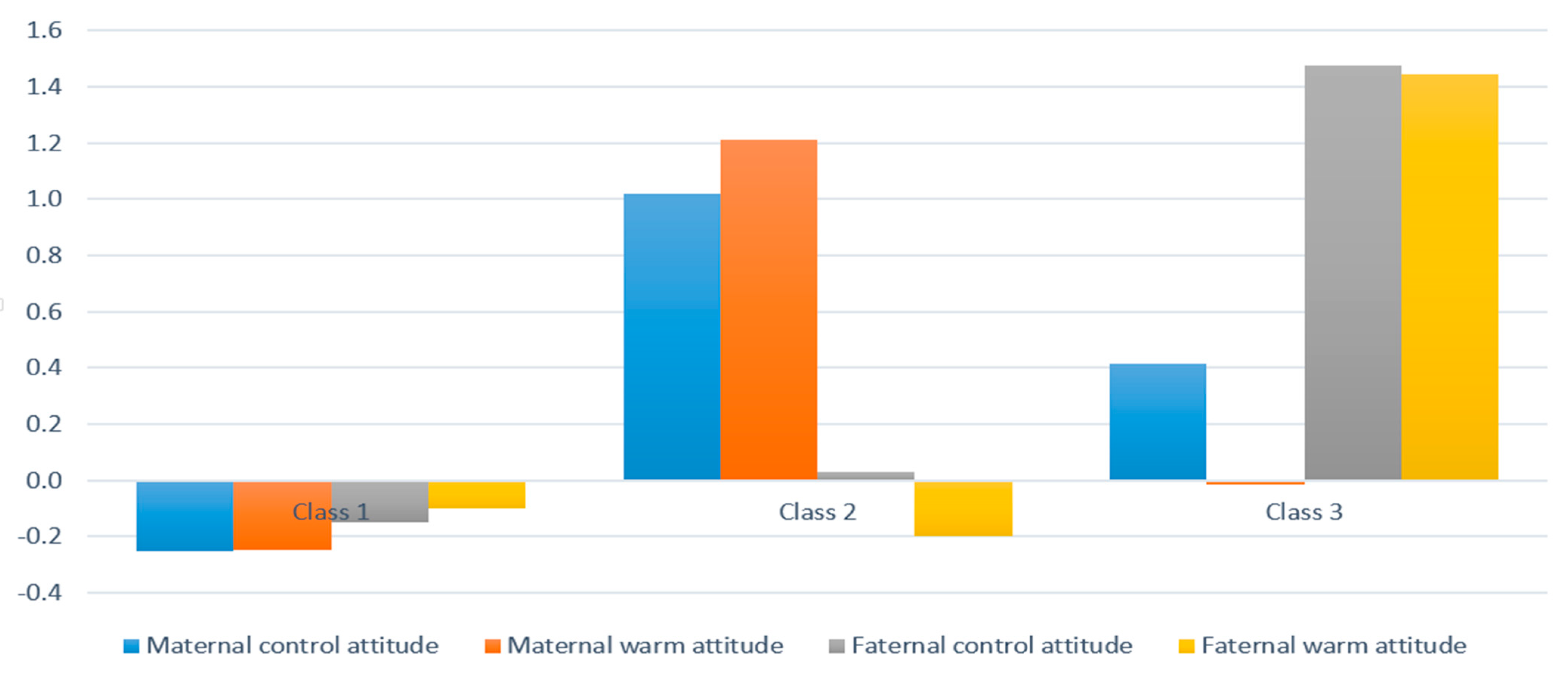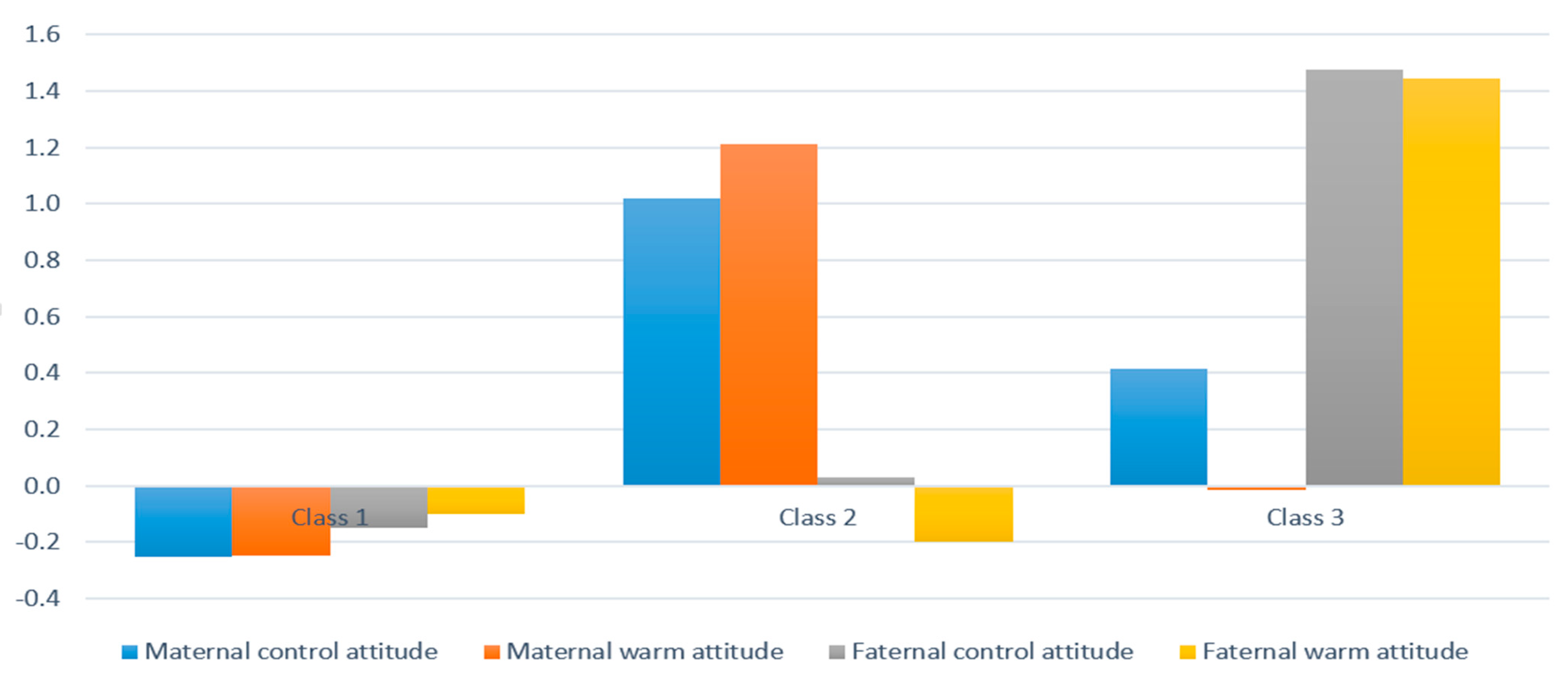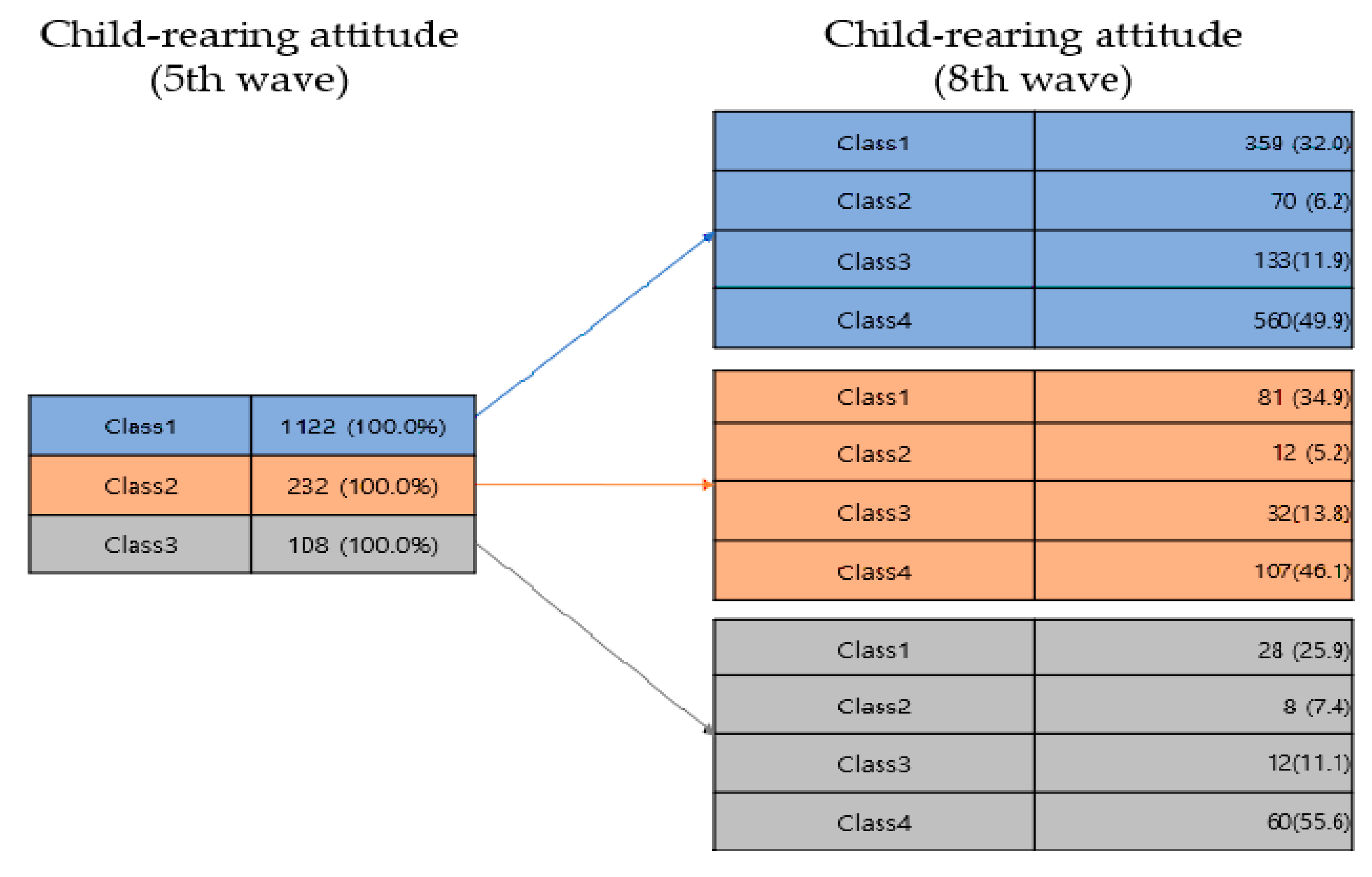Analysis of Parenting Attitude Types and Influencing Factors of Korean Parents by Using Latent Transition Analysis
Abstract
1. Introduction
2. Materials and Methods
2.1. Participants
2.2. Measurement
2.2.1. Parenting Attitude
2.2.2. Parenting Stress
2.2.3. Marital Conflict
2.2.4. Marital Satisfaction
2.2.5. Self-Esteem
2.2.6. Depression
2.3. Data Collection
2.4. Ethical Considerations
2.5. Data Analysis
3. Results
3.1. Latent Classes by Timepoint
3.2. Transition Phenomenon of Parenting Attitude
3.3. Factors Influencing the Transition of Parenting Attitude Type
4. Discussion
5. Conclusions
Author Contributions
Funding
Institutional Review Board Statement
Informed Consent Statement
Data Availability Statement
Acknowledgments
Conflicts of Interest
References
- Jane, G.; Querido, J.G.; Warner, T.D.; Eyberg, S.M. Parenting styles and child behavior in African American families of preschool children. J. Clin. Child Adolesc. Psychol. 2002, 31, 272–277. [Google Scholar] [CrossRef]
- Pozzi, E.; Vijayakumar, N.; Byrne, M.L.; Bray, K.O.; Seal, M.; Richmond, S.; Zalesky, A.; Whittle, S.L. Maternal parenting behavior and functional connectivity development in children: A longitudinal fMRI study. Dev. Cogn. Neurosci. 2021, 48, 100946. [Google Scholar] [CrossRef] [PubMed]
- Becker, W.C. Consequences of different kinds of parental discipline. Rev. Child Dev. Res. 1964, 1, 169–208. [Google Scholar]
- Kerr, M.; Stattin, H.; Özdemir, M. Perceived parenting style and adolescent adjustment: Revisiting directions of effects and the role of parental knowledge. Dev. Psychol. 2012, 48, 1540–1553. [Google Scholar] [CrossRef] [PubMed]
- Bae, S.M. The relationships between perceived parenting style, learning motivation, friendship satisfaction, and the addictive use of smartphones with elementary school students of South Korea: Using multivariate latent growth modeling. Sch. Psychol. Int. 2015, 36, 513–531. [Google Scholar] [CrossRef]
- Baumrind, D. The Influence of Parenting Style on Adolescent Competence and Substance Use. J. Early Adolesc. 1991, 11, 56–95. [Google Scholar] [CrossRef]
- Braza, P.; Carreras, R.; Muñoz, J.M.; Braza, F.; Azurmendi, A.; Pascual-Sagastizabal, E.; Cardas, J.; Martin, J.R.S. Negative Maternal and Paternal Parenting Styles as Predictors of Children’s Behavioral Problems: Moderating Effects of the Child’s Sex. J. Child Fam. Stud. 2013, 24, 847–856. [Google Scholar] [CrossRef]
- Williams, K.L.; Wahler, R.G. Are Mindful Parents More Authoritative and Less Authoritarian? An Analysis of Clinic-Referred Mothers. J. Child Fam. Stud. 2010, 19, 230–235. [Google Scholar] [CrossRef]
- Moreno-Ruiz, D.; Martínez-Ferrer, B.; García-Bacete, F. Parenting styles, cyberaggression, and cybervictimization among adolescents. Comput. Hum. Behav. 2019, 93, 252–259. [Google Scholar] [CrossRef]
- Galambos, N.L.; Barker, E.T.; Almeida, D.M. Parents Do Matter: Trajectories of Change in Externalizing and Internalizing Problems in Early Adolescence. Child Dev. 2003, 74, 578–594. [Google Scholar] [CrossRef]
- Han, J.; Lee, H. Longitudinal relationship between the child value, parenting stress, and controlling parenting attitudes and the self-esteem of children: Applying the actor-partner interdependence model (APIM) using a latent growth model. Jpn. J. Nurs. Sci. 2020, 17, 12322. [Google Scholar] [CrossRef] [PubMed]
- Mensah, M.K.; Kuranchie, A. Influence of Parenting Styles on the Social Development of Children. Acad. J. Interdiscip. Stud. 2013, 2, 123. [Google Scholar] [CrossRef]
- Vera, J.; Granero, R.; Ezpeleta, L. Father’s and Mother’s Perceptions of Parenting Styles as Mediators of the Effects of Parental Psychopathology on Antisocial Behavior in Outpatient Children and Adolescents. Child Psychiatry Hum. Dev. 2012, 43, 376–392. [Google Scholar] [CrossRef] [PubMed]
- Cummings, E.M.; Merrilees, C.E.; George, M. Fathers, Marriages and Families: Revisiting and Updating the Framework for Fathering in Family Context; John Wiley & Sons: New York, NY, USA, 2010. [Google Scholar]
- Wilson, S.; Durbin, C.E. Effects of paternal depression on fathers’ parenting behaviors: A meta-analytic review. Clin. Psychol. Rev. 2010, 30, 167–180. [Google Scholar] [CrossRef] [PubMed]
- Huang, K.-Y.; Abura, G.; Theise, R.; Nakigudde, J. Parental Depression and Associations with Parenting and Children’s Physical and Mental Health in a Sub-Saharan African Setting. Child Psychiatry Hum. Dev. 2017, 48, 517–527. [Google Scholar] [CrossRef]
- Vismara, L.; Sechi, C.; Lucarelli, L. Reflective function in first-time mothers and fathers: Association with infant temperament and parenting stress. Eur. J. Trauma Dissociation 2021, 5, 100147. [Google Scholar] [CrossRef]
- Crnic, K.A.; Gaze, C.; Hoffman, C. Cumulative parenting stress across the preschool period: Relations to maternal parenting and child behaviour at age 5. Infant Child Dev. 2005, 14, 117–132. [Google Scholar] [CrossRef]
- Krishnakumar, A.; Buehler, C. Interparental Conflict and Parenting Behaviors: A Meta-Analytic Review. Fam. Relat. 2000, 49, 25–44. [Google Scholar] [CrossRef]
- Lovejoy, M.; A Graczyk, P.; O’Hare, E.; Neuman, G. Maternal depression and parenting behavior: A meta-analytic review. Clin. Psychol. Rev. 2000, 20, 561–592. [Google Scholar] [CrossRef]
- Bergman, L.R.; Trost, K. The Person-Oriented versus the Variable-Oriented Approach: Are They Complementary, Opposites, or Exploring Different Worlds? Merrill Palmer Q. 2006, 52, 601–632. [Google Scholar] [CrossRef]
- Williford, A.P.; Calkins, S.D.; Keane, S.P. Predicting Change in Parenting Stress across Early Childhood: Child and Maternal Factors. J. Abnorm. Child Psychol. 2007, 35, 251–263. [Google Scholar] [CrossRef]
- Nylund, K.L.; Asparouhov, T.; Muthén, B.O. Deciding on the Number of Classes in Latent Class Analysis and Growth Mixture Modeling: A Monte Carlo Simulation Study. Struct. Equ. Model. Multidiscip. J. 2007, 14, 535–569. [Google Scholar] [CrossRef]
- Cho, B.H.; Lee, J.S.; Lee, H.S.; Kwon, H.K. Dimensions and assessment of Korean parenting style. J. Korean Home Econ. Assoc. 1999, 37, 123–133. [Google Scholar]
- Kim, G.H.; Kang, H.G. Development of the parenting stress scale. J. Korean Home Econ. Assoc. 1997, 35, 141–150. [Google Scholar]
- Markman, H.; Stanley, S.; Blumberg, S. Fighting for Your Marriage: Positive Steps for Preventing Divorce and Preserving a Lasting Love; New & Revised; Jossey-Bass Publishers: San Francisco, CA, USA, 2001. [Google Scholar]
- Chung, H. Application and Revision of the Kansas Marital Satisfaction Scale for Use with Korean Couples. Psychol. Rep. 2004, 95, 1015–1022. [Google Scholar] [CrossRef] [PubMed]
- Rosenberg, M. Society and the Adolescent Self-Image; Wesleyan University Press: Middletown, CT, USA, 1989. [Google Scholar]
- Kessler, R.C.; Andrews, G.; Colpe, L.J.; Hiripi, E.; Mroczek, D.K.; Normand, S.-L.; Walters, E.E.; Zaslavsky, A.M. Short screening scales to monitor population prevalences and trends in non-specific psychological distress. Psychol. Med. 2002, 32, 959–976. [Google Scholar] [CrossRef] [PubMed]
- Collins, L.M.; Lanza, S.T. Latent Class and Latent Transition Analysis: With Application in the Social, Behavioral, and Health Sciences; Wiley: Hoboken, NJ, USA, 2010. [Google Scholar]
- Akaike, H. Factor analysis and AIC. In Selected Papers of Hirotugu Akaike; Springer: New York, NY, USA, 1987. [Google Scholar]
- Schwarz, G. Estimating the Dimension of a Model. Ann. Stat. 1978, 6, 461–464. [Google Scholar] [CrossRef]
- Sclove, S.L. Application of model-selection criteria to some problems in multivariate analysis. Psychometrika 1987, 52, 333–343. [Google Scholar] [CrossRef]
- Lo, Y.; Mendell, N.R.; Rubin, D.B. Testing the number of components in a normal mixture. Biometrika 2001, 88, 767–778. [Google Scholar] [CrossRef]
- Peel, D.; McLachlan, G. Robust mixture modelling using the t distribution. Stat. Comput. 2000, 10, 339–348. [Google Scholar] [CrossRef]
- Muthén, L.K.; Muthén, B.O. Mplus User’s Guide, 7th ed.; Muthén Muthén: Los Angeles, CA, USA, 2015. [Google Scholar]
- Kuppens, S.; Ceulemans, E. Parenting Styles: A Closer Look at a Well-Known Concept. J. Child Fam. Stud. 2019, 28, 168–181. [Google Scholar] [CrossRef] [PubMed]
- Heberle, A.E.; Carter, A.S.; Briggs-Gowan, M.J. A Person-oriented Approach to Identifying Parenting Styles in Mothers of Early School-Age Children. Infant Child Dev. 2014, 24, 130–156. [Google Scholar] [CrossRef]
- Briggs-Gowan, M.J.; Carter, A. Social-Emotional Screening Status in Early Childhood Predicts Elementary School Outcomes. Pediatrics 2008, 121, 957–962. [Google Scholar] [CrossRef]
- Koo, J.Y.; Park, K.J. Parenting Profiles and Children’s Social Skills: The Mediating Role of Effortful Control. Korean J. Child Stud. 2018, 39, 89–101. [Google Scholar] [CrossRef][Green Version]
- Chao, R.K. Beyond Parental Control and Authoritarian Parenting Style: Understanding Chinese Parenting through the Cultural Notion of Training. Child Dev. 1994, 65, 1111–1119. [Google Scholar] [CrossRef] [PubMed]
- Dishion, T.J.; McMahon, R. Parental Monitoring and the Prevention of Child and Adolescent Problem Behavior: A Conceptual and Empirical Formulation. Clin. Child Fam. Psychol. Rev. 1998, 1, 61–75. [Google Scholar] [CrossRef] [PubMed]
- Kim, S.; Song, J. Latent transition analysis between the latent profiles of parenting styles and the growth latent classes of adolescents’ task values. J. Youth Adolesc. 2020, 31, 123–154. [Google Scholar] [CrossRef]
- Pinquart, M.; Gerke, D.-C. Associations of Parenting Styles with Self-Esteem in Children and Adolescents: A Meta-Analysis. J. Child Fam. Stud. 2019, 28, 2017–2035. [Google Scholar] [CrossRef]
- Nomaguchi, K.; Brown, S.L.; Leyman, T.M. Fathers’ Participation in Parenting and Maternal Parenting Stress: Variation by Relationship Status. J. Fam. Issues 2017, 38, 1132–1156. [Google Scholar] [CrossRef]



| Variables Category | n (%) | ||
|---|---|---|---|
| Father’s age (yr) | <36 | 148 | 10.1 |
| (M ± SD = 40.38 ± 3.81) | 36–40 | 612 | 41.8 |
| >40 | 702 | 48.1 | |
| Mother’s age (yr) | <36 | 526 | 36.0 |
| (M ± SD = 38.02 ± 3.76) | 36–40 | 531 | 36.3 |
| >40 | 405 | 27.7 | |
| Father’s education | Under high school | 386 | 26.4 |
| College | 262 | 17.9 | |
| Over bachelor’s degree | 814 | 55.7 | |
| Mother’s education | Under high school | 433 | 29.6 |
| College | 371 | 25.4 | |
| Over bachelor’s degree | 658 | 45.0 | |
| Residential areas | Large cities | 602 | 41.2 |
| Eup/myeon (towns/villages) | 212 | 14.5 | |
| Small and medium-sized cities | 648 | 44.3 | |
| Father’s occupation | Professionals and office workers | 716 | 49.0 |
| Machine operation and assembly workers | 189 | 12.9 | |
| Craft and related trade workers | 174 | 11.9 | |
| Sales workers | 164 | 11.2 | |
| Others | 219 | 15.0 | |
| Mother’s occupation | Manager or white collar job | 452 | 30.9 |
| House wife and other | 1010 | 69.1 | |
| Family income ($) | <4000 | 734 | 50.2 |
| (M ± SD = 4193.147) | ≥4000 | 728 | 48.8 |
| Model | AIC | BIC | saBIC | LMR-LRT | BLRT | Latent Class Distribution Rate (%) | |||
|---|---|---|---|---|---|---|---|---|---|
| 1 | 2 | 3 | 4 | ||||||
| 1 profile | 30,835.02 | 30,877.33 | 30,851.91 | - | - | 100.0 | - | - | - |
| 2 profile | 30,807.09 | 30,875.83 | 30,834.53 | 0.079 | <0.001 | 92.4 | 7.6 | - | - |
| 3 profile | 30,791.62 | 30,786.80 | 30,729.62 | 0.039 | <0.001 | 76.7 | 15.9 | 7.4 | - |
| 4 profile | 30,766.40 | 30,788.01 | 30,714.95 | 0.051 | <0.001 | 0.8 | 5.9 | 78.2 | 15.1 |
| Model | AIC | BIC | saBIC | LMR-LRT | BLRT | Latent Class Distribution Rate (%) | ||||
|---|---|---|---|---|---|---|---|---|---|---|
| 1 | 2 | 3 | 4 | 5 | ||||||
| 1 profile | 30,608.04 | 30,650.346 | 30,624.933 | - | - | 100.0 | - | - | - | - |
| 2 profile | 29,367.24 | 29,435.986 | 29,394.689 | <0.001 | <0.001 | 36.9 | 63.1 | - | - | - |
| 3 profile | 28,664.67 | 28,759.847 | 28,702.667 | 0.034 | <0.001 | 7.5 | 49.5 | 43.0 | - | - |
| 4 profile | 27,945.90 | 28,067.517 | 27,994.453 | 0.045 | <0.001 | 32.0 | 6.2 | 12.1 | 49.7 | - |
| 5 profile | 27,364.67 | 27,512.723 | 27,423.776 | 0.032 | <0.001 | 3.6 | 23.5 | 30.0 | 35.4 | 7.5 |
| 5th Wave | 8th Wave | |||||
|---|---|---|---|---|---|---|
| n (%) | Class 1 n (%) | Class 2 n (%) | Class 3 n (%) | Class 4 n (%) | ||
| Class 1 | 1122 (100.0) | → | 359 (32.0) | 70 (6.2) | 133 (11.9) | 560 (49.9) |
| Class 2 | 232 (100.0) | → | 81 (34.9) | 12 (5.2) | 32 (13.8) | 107 (46.1) |
| Class 3 | 108 (100.0) | → | 28 (25.9) | 8 (7.4) | 12 (11.1) | 60 (55.6) |
Publisher’s Note: MDPI stays neutral with regard to jurisdictional claims in published maps and institutional affiliations. |
© 2021 by the authors. Licensee MDPI, Basel, Switzerland. This article is an open access article distributed under the terms and conditions of the Creative Commons Attribution (CC BY) license (https://creativecommons.org/licenses/by/4.0/).
Share and Cite
Lee, H.; Han, J.-W. Analysis of Parenting Attitude Types and Influencing Factors of Korean Parents by Using Latent Transition Analysis. Int. J. Environ. Res. Public Health 2021, 18, 7394. https://doi.org/10.3390/ijerph18147394
Lee H, Han J-W. Analysis of Parenting Attitude Types and Influencing Factors of Korean Parents by Using Latent Transition Analysis. International Journal of Environmental Research and Public Health. 2021; 18(14):7394. https://doi.org/10.3390/ijerph18147394
Chicago/Turabian StyleLee, Hanna, and Jeong-Won Han. 2021. "Analysis of Parenting Attitude Types and Influencing Factors of Korean Parents by Using Latent Transition Analysis" International Journal of Environmental Research and Public Health 18, no. 14: 7394. https://doi.org/10.3390/ijerph18147394
APA StyleLee, H., & Han, J.-W. (2021). Analysis of Parenting Attitude Types and Influencing Factors of Korean Parents by Using Latent Transition Analysis. International Journal of Environmental Research and Public Health, 18(14), 7394. https://doi.org/10.3390/ijerph18147394






